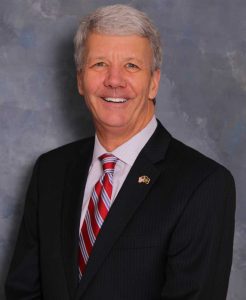Long-time State Rep. points to his history of working across the aisle in Senate bid
By Mike McGann, Editor, The Times

State Rep. Tom Killion (R-168)
Tom Killion says he knows his way around Harrisburg and suggests this isn’t the time to send someone inexperienced with the ways of the state capital to the state Senate.
The Republican from Middletown has been serving a a State Representative for the 168th District since 2003 and he’s learned the ins and outs of state government — and the keys to work with others in both parties to get things done, he said.
Killion, who previously served on the Delaware County Council, is seeking to replace state Sen. Dominic Pileggi as the senator from the 9th District. Pileggi resigned in January to take a spot on the Delaware County Court bench and Killion faces Democrat Marty Malloy in a special election on Tuesday. The two will have a fall rematch for seat, as well, and appear on the primary ballot.
While he argues he’s been effective as a State Representative, he’d be able to do more as a Senator.
“As one of 50, I can get a lot more done,” he said. “You have a much larger voice.”
And while it seems like things aren’t working in the state capital and that partisan gridlock is keeping the state from moving forward, Killion said he doesn’t think that’s entirely true.
“From the outside, it looks like Harrisburg is dysfunctional,” he said. “But it really isn’t. Most of the issues we face aren’t between Republican and Democrat, but regional.”
He cites as an example his fight for additional funding for SEPTA. While he was on the same page as many urban Democrats and suburban Philadelphia Republicans, he said it took some explaining to his colleagues in the middle of the state why it was important and what the economic impact statewide would be — noting that some 40% of the state’s revenue comes from Philadelphia and its suburban counties. He had to explain that a hit on SEPTA, would mean an economic hit on the region, and in turn, would hurt the state’s bottom line.
“Most of my colleagues will go home and beat up on Philadelphia, because its good politics,” he said, but he said he works to get their votes on issues of need for the southeast region as Chief Deputy Whip for the GOP caucus.
Killian admits to some frustration that the legislative Republicans’ two big policy initiatives, pension reform and liquor privatization have stalled but said he he thinks recent budget votes, where a number of Democrats joined Republicans in approving a veto proof majority for the fiscal code — which Gov. Tom Wolf allowed to become law, Friday could lead to further cooperation and make Wolf — maybe — finally work with the GOP.
“Gov. Wolf doesn’t negotiate,” Killion said, noting that is a marked difference from former Democratic Gov. Ed Rendell, who made numerous deals with legislative Republicans to get budgets and other priorities passed. He suggested that the governor and leaders of the legislature need to get in a room and hash out a deal.
He said he also favors suggestions of putting the state on a two-year budget cycle to reduce the drama from the yearly budget war — the current budget year’s process just ended as the talks on the 2016-17 budget started, essentially creating a non-stop budget battle in the state capital.
Still, Killion, who serves on the house Appropriations Committee, said he would continue to work for pension reform, what he calls “the gorilla in the room,” having previously worked as pension advisor in the private sector. He said he supports something along the lines of the hybrid plan for new hires of the state and school districts that was proposed last year — an employee’s first $50,000 would count toward pension and pay into the pension fund, with the rest being a 401K with a state match of 4%. It would reduce the pension liability over the long term and begin to trim costs both for the state and school district, offering some relief on property tax pressure.
Killion said that both Gov. Wolf and the Pennsylvania State Education Association — the teachers union — continue to oppose the reforms, meaning local school districts and taxpayers will continue seeing increases in pension costs.
In terms of liquor privatization, Killion said he doesn’t think it will happen in one fell swoop, but rather as a steady process, now, after legislative Republicans were unable to move their privatization proposal forward. He has served as a member of the house Liquor Control Committee, and has been directly involved in the process.
“Its going to be piecemeal,” he said, saying steps forward such as seeing wine sales in grocery stores and allowing for the direct shipment of wine to Pennsylvania homes were likely first steps.
In the end, though, he said it is inevitable — between border bleed (Pa. residents crossing into other states to buy) which studies suggest cost the state about $90 million in tax revenue and the expense of operating stores in some rural areas, a few of which are open just one day a week, yet have leases that cost the state, the system as currently run is unsustainable, he said.
On school funding, Killion expressed frustration with Gov. Wolf’s decision to disregard the Fair Funding Formula developed last year to better distribute state education funding, but attempted to instead send more money to Philadelphia, Pittsburgh and Chester-Upland. The state legislature, earlier this month, rejected that move by a veto-proof majority.
Other other issues, Killion said he has worked across the aisle — Killion was a co-sponsor on a bipartisan anti discrimination bill in 2015 — and been active on other issues. He is a co-sponsor on the controversial abortion bill HB 1948. Killion is pro-life, but said he co-sponsored the bill to make sure he was “in the room” as the bill was being shaped. He said he thought it moved too quickly to the floor and agreed with efforts to push it back to committee for further consideration.
“I get along with both sides of aisle,” he said, noting that it isn’t uncommon for him to be engaged with passionate debate on the floor with his Democratic colleagues and then later grab a beer with them to talk shop and build personal relationships.




